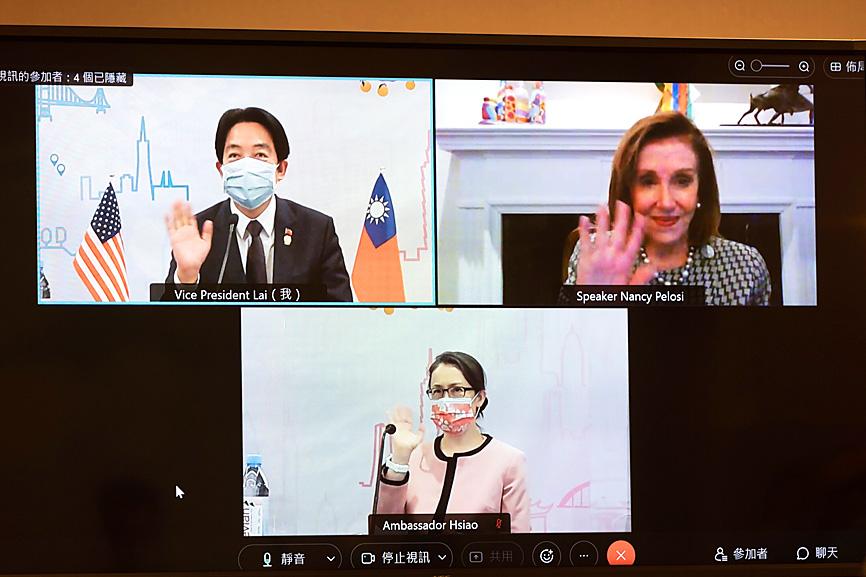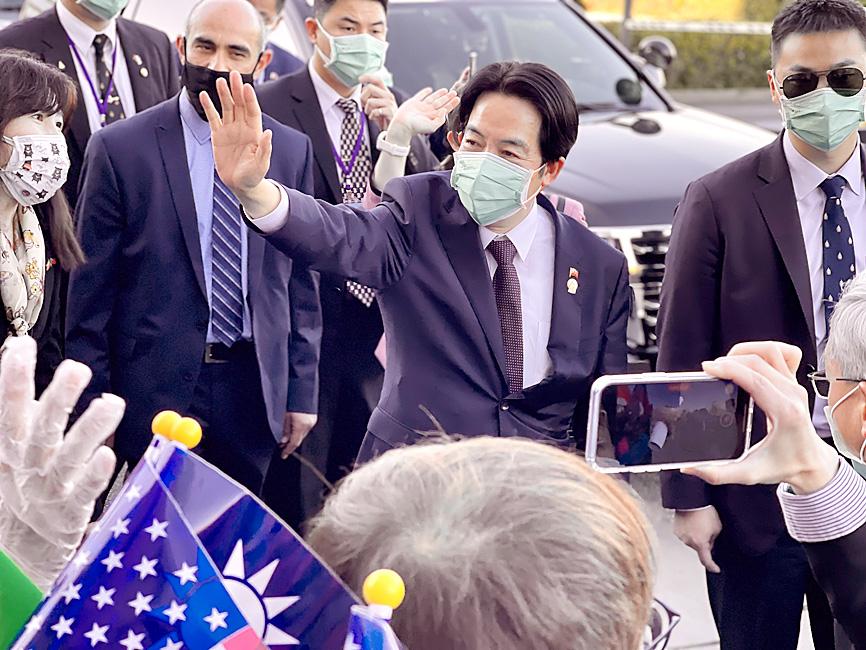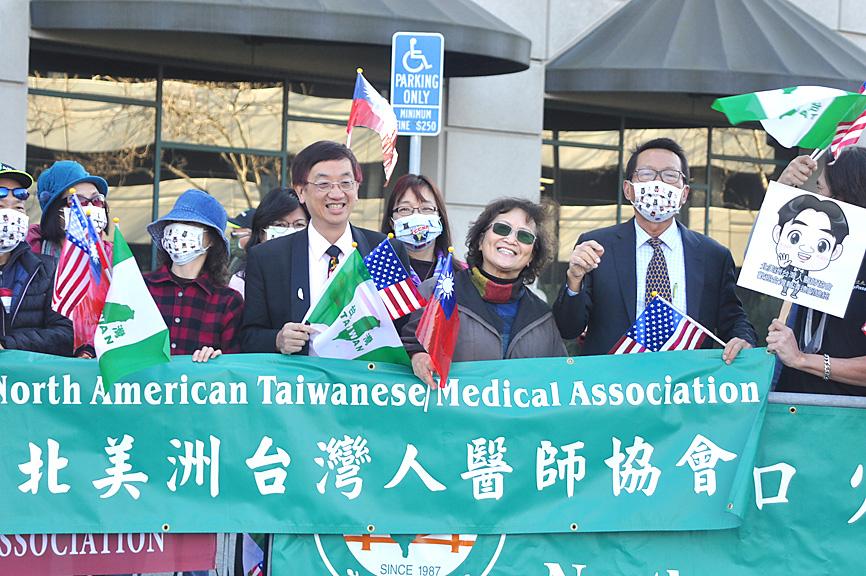Vice President William Lai (賴清德) discussed security and economic issues, as well as China, with US House of Representatives Speaker Nancy Pelosi during a virtual meeting on Friday, Representative to the US Hsiao Bi-khim (蕭美琴) said.
The meeting lasted about 30 minutes and touched on security issues, economic affairs and shared values, Hsiao told reporters after the meeting.
Pelosi expressed concern over the status and security of the Taiwan Strait, as well as human rights in China, ahead of the Beijing Winter Olympics that begins on Friday, Hsiao said.

Photo courtesy of the Presidential Office via CNA
The US has announced a diplomatic boycott of the Games, citing “genocide and crimes against humanity” in China’s Xinjiang region, which Beijing dismissed as a “self-directed political farce.”
US athletes would still attend the Games, but they would not be joined by US government officials.
Pelosi also voiced her support for Taiwan’s participation in the WHO’s activities and mechanisms, saying that she had previously conveyed her views directly to the WHO’s director-general over the matter, Hsiao said.

Photo: CNA
Pelosi recognized Taiwan’s efforts to fight COVID-19 and said the nation should not be excluded from the WHO, Hsiao said, adding that the conversation between Lai and Pelosi was “relaxed” and “amicable.”
The meeting was held shortly after Lai arrived in San Francisco for a stopover on his return trip from Honduras.
Lai later wrote on Twitter that he was pleased to meet with Pelosi, who he described as “a champion of human rights and true friend to Taiwan.”

Photo: CNA
“We are committed to working together to strengthen the US-Taiwan partnership,” Lai added.
In San Francisco, Lai was again welcomed by American Institute in Taiwan Chairman James Moriarty, before heading to the Hyatt Regency hotel, where dozens of Taiwanese expatriates greeted him.
Speaking about his trip to Honduras, Lai told a virtual meeting with representatives of the Taiwanese community that he had received a warm welcome in the Central American nation.
During his 43-hour stay in Honduras, Lai attended the inauguration ceremony of Honduran President Xiomara Castro, during which he had a brief conversation with US Vice President Kamala Harris.
He also held talks with Castro and other Honduran officials, as well as Belizean Prime Minister John Briceno.
Lai said that senior Honduran government officials, including Castro, have expressed their appreciation of the country’s ties with Taiwan and said they looked forward to improving bilateral cooperation.
The 62-year-old Honduran president had said during her presidential campaign that she would switch recognition to China if she won, although her transition team later said the new government would maintain diplomatic ties with Taiwan.
At a news conference in Tegucigalpa, Lai said the issue regarding Honduras’ ties with Taiwan had been “satisfactorily resolved.”
Lai said that Taiwan would make every effort to maintain its relations with its Central American ally and seek to work with like-minded countries, such as the US, to help improve the lives of Hondurans.
During the virtual talks with the Taiwanese community, Lai also thanked the US government for its support of Taiwan.

SECURITY: As China is ‘reshaping’ Hong Kong’s population, Taiwan must raise the eligibility threshold for applications from Hong Kongers, Chiu Chui-cheng said When Hong Kong and Macau citizens apply for residency in Taiwan, it would be under a new category that includes a “national security observation period,” Mainland Affairs Council (MAC) Minister Chiu Chui-cheng (邱垂正) said yesterday. President William Lai (賴清德) on March 13 announced 17 strategies to counter China’s aggression toward Taiwan, including incorporating national security considerations into the review process for residency applications from Hong Kong and Macau citizens. The situation in Hong Kong is constantly changing, Chiu said to media yesterday on the sidelines of the Taipei Technology Run hosted by the Taipei Neihu Technology Park Development Association. With

A US Marine Corps regiment equipped with Naval Strike Missiles (NSM) is set to participate in the upcoming Balikatan 25 exercise in the Luzon Strait, marking the system’s first-ever deployment in the Philippines. US and Philippine officials have separately confirmed that the Navy Marine Expeditionary Ship Interdiction System (NMESIS) — the mobile launch platform for the Naval Strike Missile — would take part in the joint exercise. The missiles are being deployed to “a strategic first island chain chokepoint” in the waters between Taiwan proper and the Philippines, US-based Naval News reported. “The Luzon Strait and Bashi Channel represent a critical access

CARROT AND STICK: While unrelenting in its military threats, China attracted nearly 40,000 Taiwanese to over 400 business events last year Nearly 40,000 Taiwanese last year joined industry events in China, such as conferences and trade fairs, supported by the Chinese government, a study showed yesterday, as Beijing ramps up a charm offensive toward Taipei alongside military pressure. China has long taken a carrot-and-stick approach to Taiwan, threatening it with the prospect of military action while reaching out to those it believes are amenable to Beijing’s point of view. Taiwanese security officials are wary of what they see as Beijing’s influence campaigns to sway public opinion after Taipei and Beijing gradually resumed travel links halted by the COVID-19 pandemic, but the scale of

Pope Francis is be laid to rest on Saturday after lying in state for three days in St Peter’s Basilica, where the faithful are expected to flock to pay their respects to history’s first Latin American pontiff. The cardinals met yesterday in the Vatican’s synod hall to chart the next steps before a conclave begins to choose Francis’ successor, as condolences poured in from around the world. According to current norms, the conclave must begin between May 5 and 10. The cardinals set the funeral for Saturday at 10am in St Peter’s Square, to be celebrated by the dean of the College